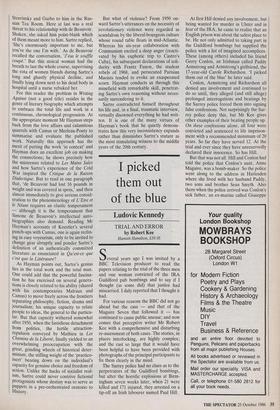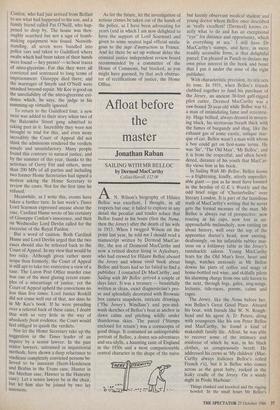I picked them out of the blue
Ludovic Kennedy
TRIAL AND ERROR
by Robert Kee Hamish Hamilton, £10.95
Several years ago I was invited by a BBC Television producer to read the papers relating to the trial of the three men and one woman convicted of the IRA Guildford pub bombings and to say if I thought (as some did) that justice had miscarried. I duly reported that I thought it had.
For various reasons the BBC did not go ahead but the case — and that of the Maguire Seven that followed it — has continued to cause public unease; and now comes that perceptive writer Mr Robert Kee with a comprehensive and disturbing re-assessment of both cases. The stories, in places interlocking, are highly complex; and the cast so large that it would have been helpful to have been provided with photographs of the principal participants to fix them clearly in the mind.
The Surrey police had no clues as to the perpetrators of the Guildford bombings, but after the horrific explosions at Birm- ingham seven weeks later, when 21 were killed and 171 injured, they arrested on a tip-off an Irish labourer named Paul Hill. At first Hill denied any involvement, but being wanted for murder in Ulster and in fear of the IRA, he came to realise that an English prison was about the safest place to be. He not only admitted to taking part in the Guildford bombings but supplied the police with a list of imagined accomplices. These (among others) included his friend Gerry Conlon, an Irishman called Paddy Armstrong and Armstrong's girlfriend, the 17-year-old Carole Richardson. 'I picked them out of the blue' he later said.
Conlon, Armstrong and Richardson all denied any involvement and continued to do so until, they alleged (and still allege) prolonged interrogations and beatings by the Surrey police forced them into signing false confessions. Not surprisingly the Sur- rey police deny this, but Mr Kee gives other examples of their beating people up. On these confessions alone, all four were convicted and sentenced to life imprison- ment with a recommended minimum of 20 years. So far they have served 12. At the trial and ever since they have unreservedly declared their innocence. So has Hill.
But that was not all. Hill and Conlon had told the police that Conlon's aunt, Anne Maguire, was a bomb-maker. So the police went along to the address in Harlesden where she lived with her husband Paddy, two sons and brother Sean Smyth. Also there when the police arrived was Conlon's sick father, an ex-marine called Giuseppe Conlon, who had just arrived from Belfast to see what had happened to his son, and a family friend called Pat O'Neill, who hap- pened to drop by. The house was thor- oughly searched but not a sign of bomb- making equipment was found. Notwith- standing, all seven were bundled into police cars and taken to Guildford where swabs which had been taken of their hands were found — hey presto! — to bear traces of nitro-glycerine. For this they were all convicted and sentenced to long terms of imprisonment. Giuseppe died there; and the marriages of Smyth and O'Neill were smashed beyond repair. Mr Kee is good on the unreliability of the nitro-glycerine evi- dence which, he says, the judge in his summing-up virtually ignored.
To return to the Guildford four, a new twist was added to their story when two of the Balcombe Street gang admitted to taking part in it. Incredibly they were not brought to trial for this, and even more incredibly the Court of Appeal did not think the admissions rendered the verdicts unsafe and unsatisfactory. Many people found this contrary to natural justice, and by the summer of this year, thanks to the activities of Gerry Fitt and others, more than 200 MPs of all parties and including two former Home Secretaries had signed a motion asking the Home Secretary to review the cases. Not for the first time he refused.
Meanwhile, as I write this, events have taken a further turn. In last week's Times Lord Scarman expressed unease about the case, Cardinal Hume wrote of his certainty of Giuseppe Conlon's innocence, and then on Wednesday Lord Devlin called for the excercise of the Royal Pardon.
But a word of caution. Both Cardinal Hume and Lord Devlin urged that the two cases should also be referred back to the Court of Appeal. In my view that would be too risky. Although given rather more scope than formerly, the Court of Appeal is still apt to take too restrictive a view of a case. The Luton Post Office murder case was one of the most glaring recent exam- ples of a miscarriage of justice, yet the Court of Appeal upheld the convictions no less than five times. Lord Justice Roskill did not come well out of that, nor does he in Mr Kee's book. If he were presiding over a referral back of these cases, I doubt that with so very little in the way of absolutely fresh evidence, the Court would feel obliged to quash the verdicts.
Nor let the Home Secretary take up the suggestion in the Times leader of an inquiry by a senior lawyer. In the past senior lawyers, untrained in inquisitorial methods, have shown a deep reluctance to vindicate completely convicted persons be- lieved to be innocent (Scott-Henderson and Brabin in the Evans case, Hunter in the Meehan case, Hawser in the Hanratty case). Let a senior lawyer be in the chair, but let him also be joined by two lay assessors. As for the future, let the investigation of serious crimes be taken out of the hands of the police, as I have been advocating for years (and in which I am now delighted to have the support of Lord Scarman) and given to some neutral legal official anala- gous to the juge d'instruction in France. And let there be set up without delay the criminal justice independent review board recommended by a committee of the House of Commons, but blocked, as you might have guessed, by that arch obstruc- tor of rectifications of justice, the Home Office.



























































 Previous page
Previous page